'These children are wards of the State. They were exploited because the state government and its officials didn't do their jobs.'
Satyavrat Mishra reports from Patna.
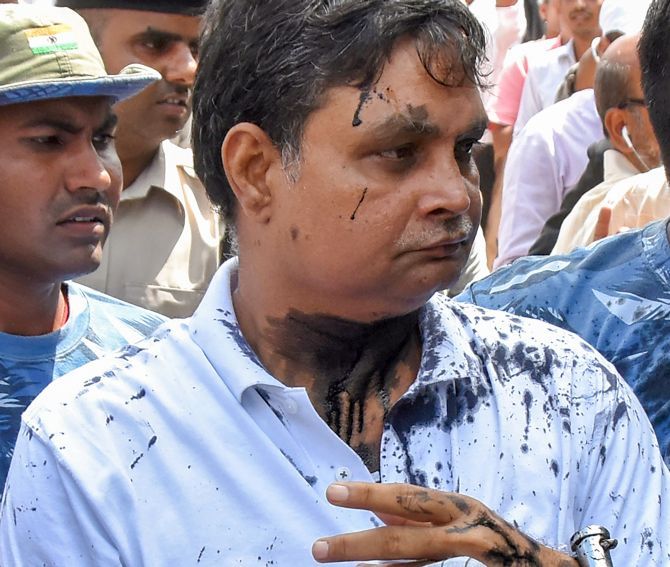
In their statements, the children at the home said they were forced to 'entertain' Thakur and other male guests in the facility.
Refusing to do so, they said, meant merciless beating and no food for days. Photograph: PTI Photo
It was around mid-July last year.
Bihar was going through political turmoil, with Chief Minister Nitish Kumar and Rashtriya Janata Dal chief Lalu Prasad Yadav, then alliance partners, engaged in a bitter war of words.
The Central Bureau of Investigation had registered a case against Yadav, his wife Rabri Devi and their son Tejaswi Yadav (then deputy chief minister of Bihar), for alleged irregularities during the senior Yadav's tenure as Union railway minister in 2006.
While this was on, the state government's social welfare department quietly engaged Koshish -- a field action project of the Tata Institute of Social Sciences, Mumbai -- to conduct a social audit of all of Bihar's 110 state-funded shelter homes.
A seven-member team, including three women psychologists, landed in Patna in October and began work. It submitted its preliminary report in March, 2018 to the department and the final one on May 9.
The officials who read the findings were aghast.
The report, which has since been designated as a top-secret government paper, pointed at rampant sexual exploitation in the shelter homes.
The most notable one was in Muzaffarpur were several minor girls, aged 7 to 14, had complained about sexual abuse.
"Given the alarming situation, we swung into action. The safety of children is paramount," said Social Welfare Department Principle Secretary Atul Prasad.
"It was decided that we would swiftly and safely shift the children from the particular shelter home in Muzaffarpur to safe places. A meeting of senior district officials was called under the pretext of a routine audit," added Prasad.
"In the meeting, the officials were told about the findings and ordered to shift the children as soon as possible, without raising an alarm," Prasad revealed.
"After this was done, they were asked to file first information reports against those running the shelter homes."
On May 29, news about the rape and abuse of children in the shelter home broke out.
Brajesh Thakur, the man who ran the shelter home, was arrested on June 3.
And on June 26, the district child welfare officer, Ravi Kumar Roushan, was also arrested after the girls named him as well as one of their tormentors.
The special Protection of Children from Sexual Offences -- POCSO -- court in Muzaffarpur ordered a medical examination of all the girls.
The state government, meanwhile, refused to comment on the matter, until the medical report came out on July 19.
The Patna Medical College and Hospital, where the tests were conducted, confirmed that at least 34 of the 42 girls had been sexually abused.
The government was left red-faced.
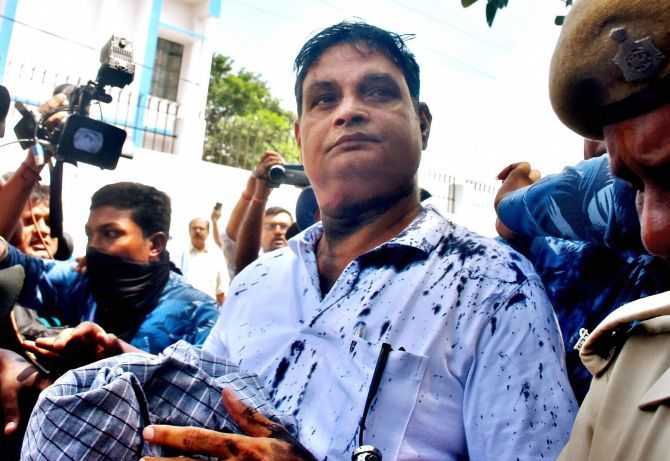
Gory details about life in the shelter home began to emerge.
In their statements to the police, the children said they were beaten and kept hungry. The staff, including some women, would force themselves on the hapless girls.
In their statements, the children said they were forced to 'entertain' Thakur and other male guests in the facility.
They said that refusing to do so meant merciless beating and no food for days.
Many of them also said they were regularly drugged.
The officials, who were tasked with protecting the girls, would either turn a blind eye to these goings-on or were themselves exploiting them.
The Supreme Court also pulled up the Nitish Kumar government in the matter, saying that the state had in a way financed these activities by giving public funds to these shelter homes.
'Why did the state allow these to happen? The state gave funds so in a way it financed these activities,' noted Justices Madan B Lokur, Deepak Gupta and K M Joseph.
The case took a political turn when the wife of the jailed child protection officer claimed that Chandra Shekhar Verma, the husband of former social welfare minister Manju Verma, used to visit the shelter home in Muzaffarpur.
The lawmaker from Begusarai district initially refuted this charge, calling it a political conspiracy. Chief Minister Nitish Kumar also defended his former colleague.
However, on August 7, it was reported that Thakur and the minister's husband had spoken 17 times between January and May this year. Manju Verma resigned the next day.
Monitored by the Patna high court, the CBI is now investigating the case.
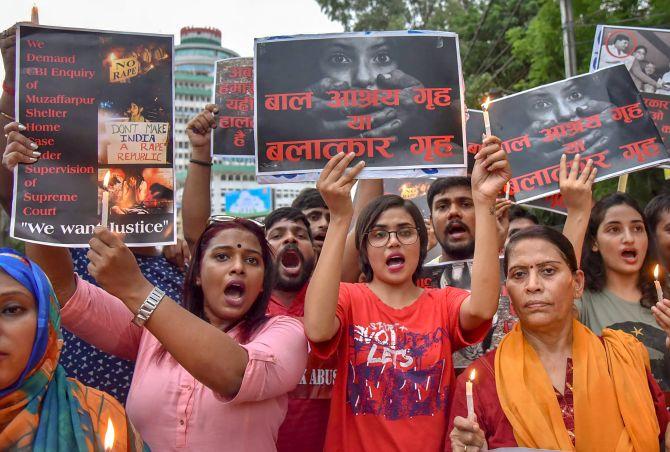
The Muzaffarpur case is among the many cases of neglect and exploitation of children in Bihar.
The TISS report points to several previously untold stories of horror involving both boys and girls to underline the apathy, violence and exploitation that these children routinely face.
Horrible living conditions, an unsafe environment and an unending series of beatings were all a part of life at various shelter homes.
Several shelter homes in Patna, Araria, Kaimur, Munger, Bhagalpur, Motihari and Gaya districts of the state are also under the scanner.
In most such homes, the staff treats children as criminals and often beats them for the tiniest mistake.
In one shelter home in Araria district, police guards stationed for the safety of the children were themselves found thrashing them.
In another case at a shelter home for girls in Patna, the minor girls accused the NGO officials of sexual and physical abuse.
In multiple cases, the NGO refused to provide a phone for the girls to contact their families.
In Bhagalpur, some children wrote letters to the district officials and the child welfare committee. They tried to complain about the wretched living conditions and continuous beatings.
These letters were found dumped behind the district child protection office.
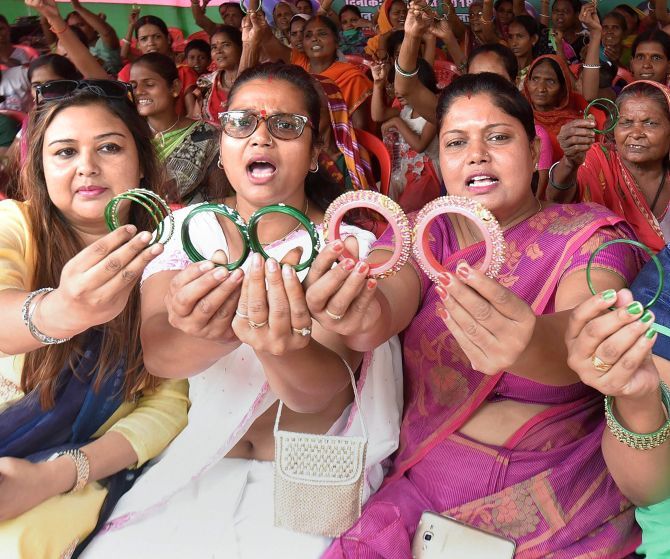
Girls weren't the only ones who suffered sexual assault.
The state government has found evidence that boys, too, were sexually exploited in Gaya, Bhagalpur and Motihari. The government has ordered an inquiry and the contracts of the NGOs involved have been cancelled.
Officials have also said that in some cases the children were forced to clean the floors and the bathrooms, wash clothes of the staff and cook meals.
"There is good money involved in this shelter home business. According to the law, the government bears 90 per cent of the cost of a shelter home and the NGO is supposed to pay the remaining 10 per cent," says a senior official of the social welfare department, on the condition of anonymity.
"A shelter home costs the state government Rs 3 million to Rs 3.5 million annually. Only a fraction of this money is spent on the children," he alleges, adding, "Part of this money is also used to bribe officials, who then turn a blind eye to the conditions the children have to endure."
Shelter homes may have come in for heavy criticism, but officials also point to various orphanages and homes that have been doing exemplary work -- instances of which can be found in Bhagalpur, Darbhanga, Saran, Buxar, Katihar and Purnia.
The officials say that the TISS social auditors were particularly pleased by the conditions at Darbhanga's observation home. Here, traumatised children are treated with love and care by the staff.
At Buxar's children's home, kids are encouraged to paint and read; they are also issued a book every night to read before going to sleep.
At Bhagalpur's children centre for girls, the officials encountered a positive atmosphere.
The staff is full of affection and celebrates the children's birthdays every year.
Children are encouraged to teach and share with their 'younger siblings' at Katihar's children's home as a way to strengthen the bond between them.
The specialised adoption centre in Saran District was declared one of the best-run institutions in the country.
However, the officials admit that such institutions are a rarity and that there is an urgent need to fix a broken system.
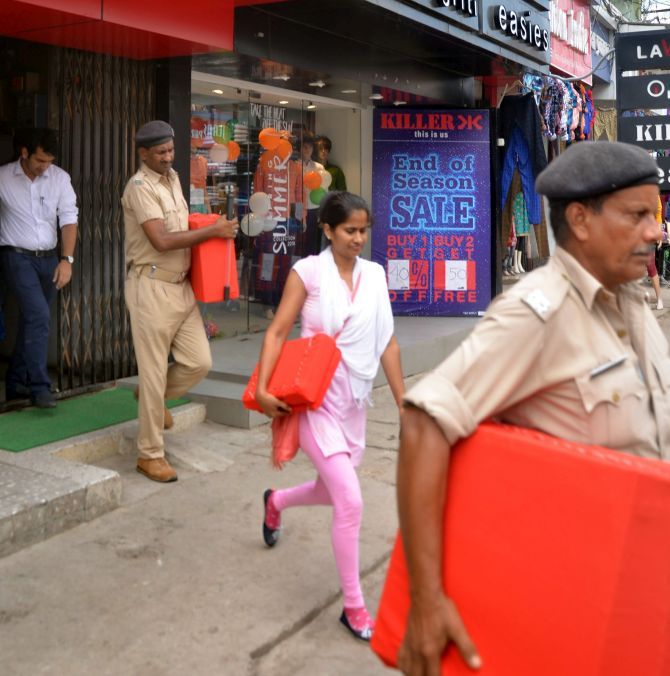
Disturbed by the findings of the TISS social audit and the barrage of criticism, the Bihar government has now decided to entirely change the way shelter homes operate.
'The NGO model is practised across the country. The Muzaffarpur incident showed that it is seriously flawed and has several deficiencies. Therefore, we have decided that the NGOs will not be engaged anymore to run shelter homes in state. They will be operated by government agencies,' said Chief Minister Nitish Kumar.
'I have asked the social welfare department to hire necessary manpower and construct its own buildings. The decision will be implemented in a phase-wise manner,' he added.
Nitish Kumar has also ordered the district administrations to investigate all shelter homes in the state and file FIRs if any anomalies are detected.
'I have asked the chief secretary to do a full review. The investigation in this case will help make the system stronger,' he added.
"These children are wards of the State. They were exploited because the state government and its officials didn't do their jobs. The neglect of the senior officials in this case is, in fact, criminal negligence," notes an Indian Police Service officer.
"They must also be punished to send out a stronger message. Otherwise, they might just re-enter the system and continue ruining children's lives."











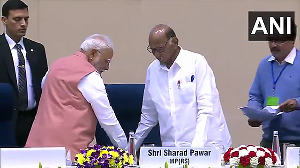
 © 2025
© 2025